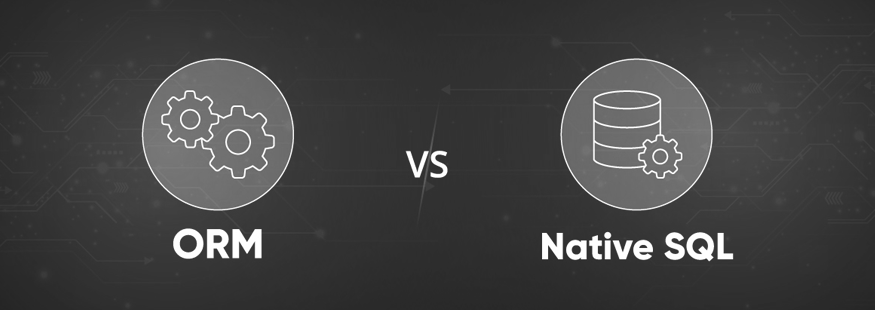Quick Summary
As a solution architect or a senior developer, one of the crucial decisions you’ll often face in designing applications is how to interact with the database efficiently. Two primary approaches for querying databases are Object-Relational Mapping (ORM) and Native SQL. Both have advantages and disadvantages, and selecting the appropriate one depends on various factors, including the specific use case and the nature of the application architecture.
In this blog post, we’ll delve into characteristics, pros, and cons of both approaches and discuss when to choose one over another while exploring how Domain-Driven Design (DDD) principles relate to this decision-making process.
Object-Relational Mapping (ORM):
ORM frameworks, such as Hibernate (for Java), Entity Framework (for .NET), and SQLAlchemy (for Python), provide a higher-level abstraction over database operations. Instead of writing raw SQL queries, developers work with objects and classes, and the ORM handles the translation between these objects and the database tables.
Advantages of ORM:
- Productivity: ORM simplifies the development process by reducing the boilerplate code required for database operations. Developers can focus on business logic rather than database interactions.
- Portability: ORM frameworks often provide database abstraction layers, allowing developers to switch between different database systems without rewriting significant portions of the codebase.
- Maintenance: ORM abstracts away the database-specific implementation details, making it easier to refactor or modify the underlying database schema without affecting the application code.
Disadvantages of ORM:
- Performance Overhead: ORM frameworks may introduce performance overhead due to the abstraction layer and the need for additional processing to translate object-oriented operations into SQL queries.
- Complexity: ORM mapping configurations and behaviors can become complex, especially for complex data models or advanced database operations, leading to potential performance bottlenecks or unexpected behavior.
- Limited Control: ORM frameworks may not always expose all database features or optimizations, limiting the developer’s ability to fine-tune queries for performance.
Native SQL:
Native SQL involves writing SQL queries directly to interact with the database without relying on an abstraction layer provided by an ORM framework.
Advantages of Native SQL:
- Performance: Native SQL allows developers to optimize queries for performance, leveraging database-specific features such as indexes, stored procedures, and query hints.
- Flexibility: Developers have complete control over the SQL queries, enabling them to write complex queries tailored to specific use cases or database optimizations.
- Transparent: With Native SQL, developers must clearly understand the database interactions, which can be beneficial for troubleshooting performance issues or debugging complex queries.
Disadvantages of Native SQL:
- Boilerplate Code: Writing raw SQL queries can lead to verbose code, especially for CRUD (Create, Read, Update, Delete) operations and mapping the result sets to application objects.
- Portability: Native SQL queries are often tied to a specific database system, making it challenging to switch between databases without rewriting significant portions of the codebase.
- Maintenance: Changes in the database schema may require manual updates to the SQL queries, potentially introducing maintenance overhead, especially in large codebases.
Choosing the Right Approach:
The decision between ORM and Native SQL depends on various factors, including:
- Complexity of the Data Model: For simple CRUD operations on straightforward data models, ORM can provide productivity benefits. However, for complex data models with intricate relationships or performance-critical queries, Native SQL might be more suitable.
- Performance Requirements: If the application has strict performance requirements or deals with large datasets, Native SQL allows for fine-tuning queries and leveraging database optimizations.
- Developer Skill Set: Consider the expertise of your development team. Developers familiar with SQL may prefer Native SQL for its flexibility and control, while those with experience in ORM frameworks may find it more productive.
Domain-Driven Design (DDD) Consideration:
In Domain-Driven Design (DDD), the choice between ORM and Native SQL aligns with the principles of focusing on the domain model and business logic. ORM can be beneficial for mapping domain entities to database tables and simplifying domain-driven development, especially for CRUD operations on aggregates. However, for complex domain logic or performance-critical operations within domain services, Native SQL might offer better control and optimization opportunities.
In conclusion, both ORM and Native SQL are valid approaches to database querying, each with its advantages and disadvantages. Understanding the specific requirements, performance considerations, and developer preferences will guide you to choose the ideal application architecture. Whether you opt for ORM or Native SQL, the ultimate goal is to ensure efficient database interactions while maintaining code maintainability and performance.
Ready to take your software projects to new heights? Discover the perfect balance between ORM and Native SQL with UpsquareCS. Our expert developers can help you optimize your database performance and streamline your applications.
We create high-performance, scalable solutions tailored to your unique needs. Reach out to us today to learn more about our services and how we can supercharge your software development journey!







